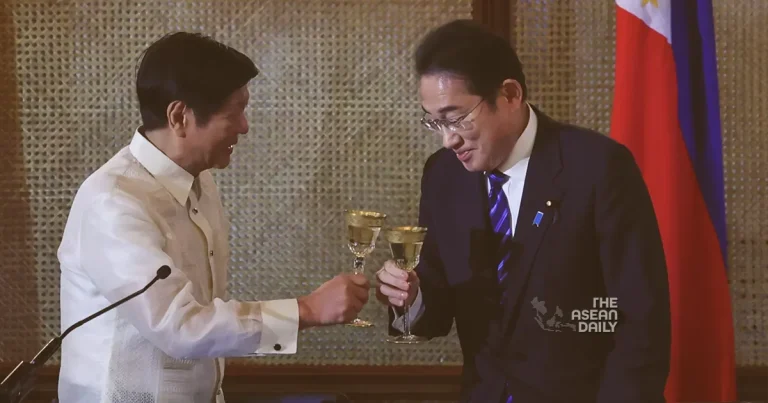18-3-2024 (MANILA) The Philippines, the United States, and Japan are edging closer to orchestrating the inaugural official meeting between President Ferdinand Marcos Jr. and his counterparts, US President Joe Biden and Japanese Prime Minister Fumio Kishida, in Washington next month. The objective is to bolster trilateral cooperation among the three allies, particularly in response to China’s escalating assertiveness.
Scheduled for mid-April, the anticipated summit aligns with Kishida’s upcoming journey for the US-Japan Summit, disclosed a government official familiar with the matter to the Inquirer.
Kishida, marking the first Japanese leader to undertake a state visit to the United States since former Prime Minister Shinzo Abe in 2015, is slated to engage in discussions with Biden on April 10, followed by an address to a joint session of the US Congress the subsequent day, as per news reports.
This unprecedented standalone summit of the trio is anticipated to concentrate on fortifying economic and security bonds.
Mr. Marcos has previously engaged with both leaders separately during his official visits and on the sidelines of multilateral gatherings.
Last November, the President also hosted Kishida, who notably became the first Japanese leader to address both chambers of Congress in a special session.
A series of bilateral meetings between officials from Manila and Washington are anticipated during Mr. Marcos’ forthcoming trip to follow up on outcomes from his visit to the United States last year, disclosed the same official speaking on condition of anonymity due to lack of authority to address the press.
The Foreign Ministers of the three nations—Secretary Enrique Manalo of the Philippines, US Secretary of State Antony Blinken, and Foreign Minister Yoko Kamikawa of Japan—were initially slated to convene in Manila this week ahead of the April summit. However, the official stated that this arrangement has been scrapped due to “scheduling concerns.”
Nevertheless, Blinken is set to embark on his second visit to Manila on Monday and Tuesday to explore avenues for advancing the partnership between both countries, particularly in the economic sphere, as confirmed by the Department of Foreign Affairs last week. His visit follows closely after the United States dispatched a high-level trade and investment mission to the Philippines.
Last year, the national security advisers of the three nations—Eduardo Año, Jake Sullivan of the United States, and Takeo Akiba of Japan—convened in Tokyo for their inaugural meeting, wherein they pledged to fortify defense cooperation to uphold peace and stability in the region amid China’s mounting assertiveness.
Both the Philippines and Japan, staunch US allies, are embroiled in territorial disputes with China. Manila confronts Beijing’s excessive claims over the vast majority of the South China Sea, while Tokyo contends with China’s repeated incursions into Japanese-administered Senkaku Islands in the East China Sea.
A reciprocal access agreement currently under negotiation between Manila and Tokyo will facilitate larger military exercises between the two countries and enhanced access to each other’s bases in the future.
The Philippine Marine Corps recently dispatched a small contingent to observe the Japan-US military exercise Iron Fist in the Kyushu and Okinawa regions in Japan, reportedly simulating a “Taiwan emergency.”
Last year, the Philippines extended greater access to its military bases to the United States through the Enhanced Defense Cooperation Agreement. Both nations are poised to conduct one of their largest-ever military exercises in the Philippines next month.
Since assuming office amid escalating tensions with China over the West Philippine Sea, President Marcos has intensified alliances with like-minded countries.
During his official visit to Germany last week, the President expressed his intent to “strengthen cooperation” with Washington and Tokyo. “We hope the intention is to continue to plan, to strengthen the cooperation between the three countries—the United States, Japan, and the Philippines,” he conveyed to reporters.
“It is probably just formalizing what we are already doing, which will put a bit more structure to what we will do—interoperability and the actual joint cruises that we are having. So, that is still in flux, so we have to talk about it some more. Let’s wait for the developments that will come from Washington, from Tokyo, and here in Manila,” Mr. Marcos elaborated.




